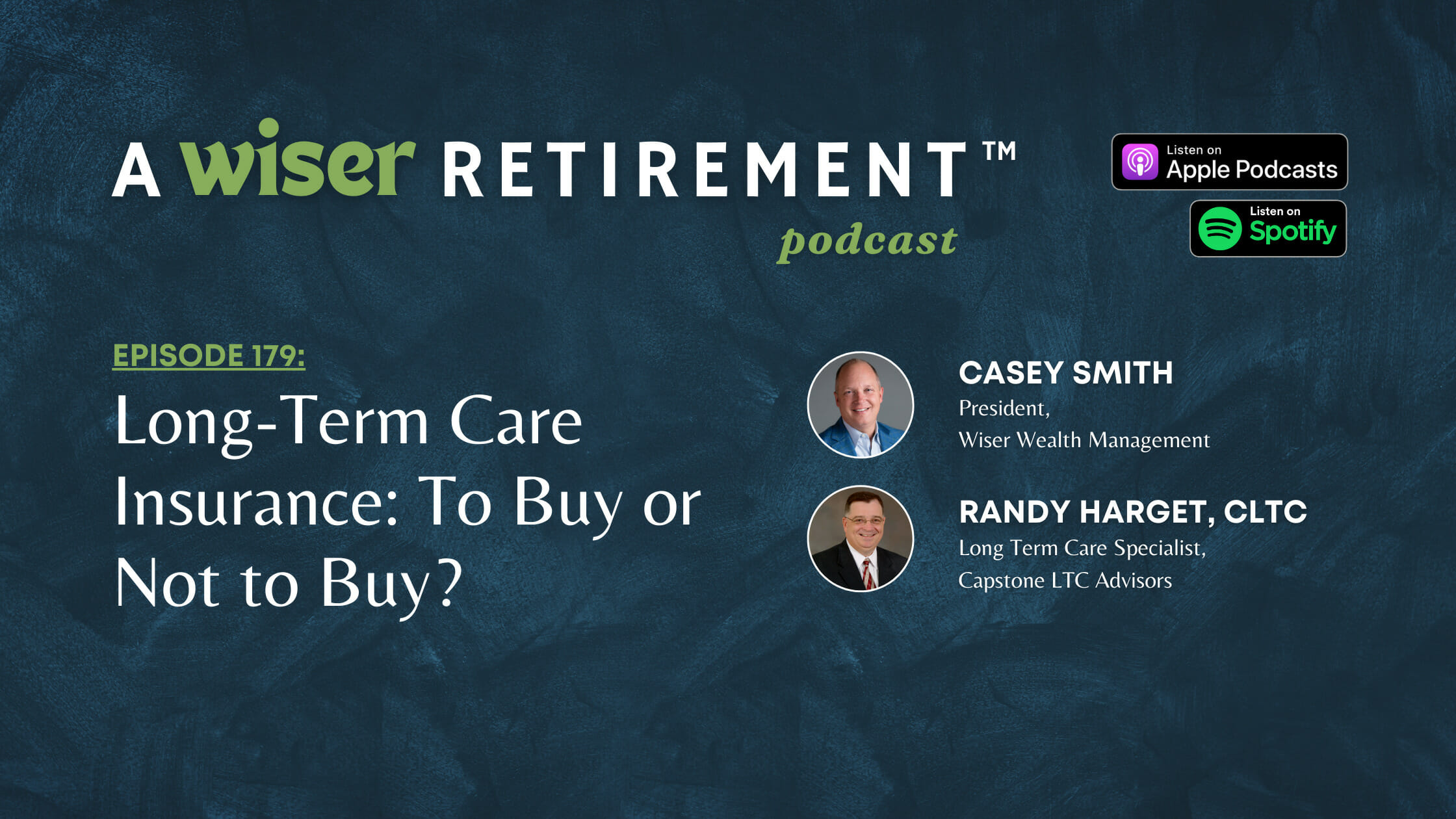
Long-Term Care Insurance: To Buy or Not to Buy?
On this episode of A Wiser Retirement™ Podcast, Casey Smith is joined by guest Randy Hargett, CLTC, who is a Long-Term Care Specialist at Capstone LTC Advisors, to talk about how you can confidently secure your future and protect your family’s wealth against potential catastrophic events. They will also help you determine whether you should buy long-term care insurance.
SUMMARY:
Long-term care insurance has become increasingly popular, as people are beginning to better understand the effects of either self-insuring or having a family member be the caregiver. The need for long-term care usually falls under one of two categories: people who have an asset base worth more than $100,000 or those who have an income that derives from an investment. As a result, there are different reasons why many choose to get long-term care insurance. A seemingly common reason is that they don’t want to burden their family members with the responsibility of caregiving. Other times, they have closely seen a relative burn through mom or dad’s assets to pay for the care of a beloved parent.
Which kind of Care Insurance to get?
Long-term Care
Buying a long-term care policy that covers everything, is essentially unaffordable to most people. The recommendation is to purchase insurance that is substantial and covers some important areas. 75% of policies in this business are traditional, which consists of a policy that resembles a lot of homeowners insurance. For example, you pay it regularly but if you end up never needing coverage, you don’t get anything from it. Again, while this option provides no payback and doesn’t cover everything, it’s of foremost importance to design a plan that’s enough to cover a substantial part of your medical expenses when and if you need it.
Self-Insurance
If you ask people with assets of around $3M to $5M if they have thought of self-insuring, the answer is always a resounding yes. However, in the last few years, there has been an increase especially from people in this financial range, looking to get long-term care when they had initially thought they would self-insure. Long-term care insurance not only protects your assets from going all into care for yourself or your spouse, but it also helps you keep up with inflation, if you ever need the care.
Short-term Care
Short-term care basically covers a 1 or 2 year period for at-home care, or care at a facility. This option was initially designed for patients who went through difficult surgeries and needed help during the recovery period. This option can be very helpful to family members. Though it won’t cover longer than a couple of years, it is a way to help them get past the initial shock of a new reality. It also gives them time to prepare for the following years.
Finally, setting up long-term care insurance is mostly done because of the love you have for your family. If you know someone who have been appointed as the primary care-giver of a parent or grandparent for years, you know that one of the greatest devastations in long-term care is what it does to the caregiver.
Download our eBook on “Buyer Beware: Why do they keep trying to sell you that annuity?”
TIMESTAMPS:
0:00 Intro
04:50 Long-term Care
07:25 Self- Insurance
08:55 Short-term Care
LINKS:
Learn more about Casey Smith
CONNECT:
Twitter, Instagram, Facebook, LinkedIn, and YouTube.
Learn more about A Wiser Retirement™ podcast and access previous episodes.
Share This Story, Choose Your Platform!
Wiser Wealth Management, Inc (“Wiser Wealth”) is a registered investment adviser with the U.S. Securities and Exchange Commission (SEC). As a registered investment adviser, Wiser Wealth and its employees are subject to various rules, filings, and requirements. You can visit the SEC’s website here to obtain further information on our firm or investment adviser’s registration.
Wiser Wealth’s website provides general information regarding our business along with access to additional investment related information, various financial calculators, and external / third party links. Material presented on this website is believed to be from reliable sources and is meant for informational purposes only. Wiser Wealth does not endorse or accept responsibility for the content of any third-party website and is not affiliated with any third-party website or social media page. Wiser Wealth does not expressly or implicitly adopt or endorse any of the expressions, opinions or content posted by third party websites or on social media pages. While Wiser Wealth uses reasonable efforts to obtain information from sources it believes to be reliable, we make no representation that the information or opinions contained in our publications are accurate, reliable, or complete.
To the extent that you utilize any financial calculators or links in our website, you acknowledge and understand that the information provided to you should not be construed as personal investment advice from Wiser Wealth or any of its investment professionals. Advice provided by Wiser Wealth is given only within the context of our contractual agreement with the client. Wiser Wealth does not offer legal, accounting or tax advice. Consult your own attorney, accountant, and other professionals for these services.





